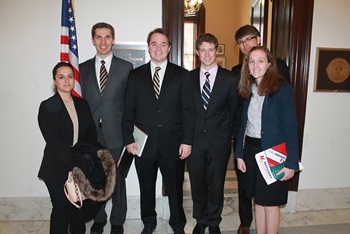
On April 8, five students from the Materials Science and Engineering Department of Drexel University’s College of Engineering paid a visit to Capitol Hill in Washington, DC. They spent time in the Senate and House office buildings meeting with staffers of U.S. Senators and Representatives and advocating for increased federal funding of basic STEM research. This was part of the Congressional Visitations Day, which was sponsored by the Material Advantage in collaboration with the American Association for the Advancement of Science. Over 30 people from different Universities participated on these meetings, which were all held on April 8th. Among the students from Drexel were two Ph.D. candidates and three undergraduates:
- Boris Dyatkin- Ph.D. candidate
- Kelsey Hatzell- Ph.D. candidate
- Sean Orzolek- B.S. student
- Alex McBride- B.S. student
- Pelin Kansu Lemons- B.S./M.S. student
With federal funding of scientific research diminishing as a share of the GDP over the past 10 years, with several exceptionally painful cuts recently incurred due to sequestration, these students felt the need to try and ramp up funding for scientific research.
There are countless reasons why basic research funding is important for economic and social prosperity of the United States. Drawing from personal experiences, the students brought up three major talking points with the staffers to explain their advocacy efforts:
- Federally funded research helps solve our nation’s biggest challenges, such as health care, energy security, the environment, etc. Solving the problems of today and tomorrow requires strong federal investments in both basic research and in universities, which train the next generation of innovators.
- Federally funded scientific research is important to our economy and competitiveness. The technology that is a product of scientific research provides billions of dollars to the economy each year and supports many long-term jobs. However, without funding, our competitive edge as the world’s most innovative nations begins to wane.
- Funding cuts will turn young scientists and engineers away from careers in scientific research. Because of these funding cuts, not only will we miss out on new discoveries, but we are in danger of losing generations of new, yearning scientists. A lot of students studying a field of science at Drexel came here because of the scientific research opportunities.
In an interview with Boris Dyatkin, he discussed his opinion on the current situation’s impact on potential scientists. “I believe that the lack of opportunities for brilliant scientists in this country will cause a large number of long-term catastrophic problems for our nation’s economic growth and national security. Aspiring researchers will apply their skills in other, more lucrative careers, or take their talents to other countries (who are, in a way, our competitors).”
A lot of funding for research comes in the form of research grants. Most of the grants that go to Drexel University’s College of Engineering come from the National Science Foundation and the Department of Energy. There are several branches of the Department of Energy that contribute to certain grants, such as the Office of Basic Energy Science and the Office of Science funding The Energy Research Center. However, Boris believes that an increase in future funding is not very likely, saying, “A large number of lawmakers, both Republican and Democrat, who retired in the last 4 years or will retire this year have been active proponents of science funding. Newly elected Senators and Representatives rarely list this as a priority. Previous national pushes to expand science education and research relied on unique circumstances, such as the Space Race and the Cold War.”
Of the six staffers with whom the Drexel students met, four of them work for senators and representatives from the state of Pennsylvania, with the other two being from New Jersey and Connecticut: Allyson Schwartz, Pat Meehan, and Jon Runyan, Bob Casey Jr., Pat Toomey, and Chris Murphy.
Drexel students have been attending this event for three years now, having increased their numbers from one student to five this year. Each Drexel student that attended this year had their own stories to tell, such as cutting-edge equipment at Oak Ridge Laboratory that depends on federal funding, the benefits of national fellowships provided by the NSF, and inspiring up and coming scientists. It is because of students like these that those who have the power to change things hear the concerns of many. And with change comes promise for a brighter, more innovative tomorrow.
“Aspiring scientists must be as flexible as possible when selecting the type of research they wish to pursue. Much of emerging research will be driven by market demand, so it pays off to be aware of what innovations in what fields are attracting the most interest,” adds Boris. “Furthermore, it is the job of all of us in the scientific field to advocate for funding and educate the public and lawmakers about its critical importance, to make sure that we are never overlooked. The more engaged we all are in the national conversation regarding research, the more public support we will receive.”